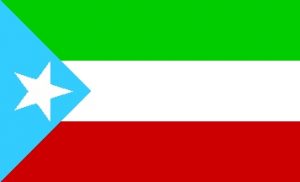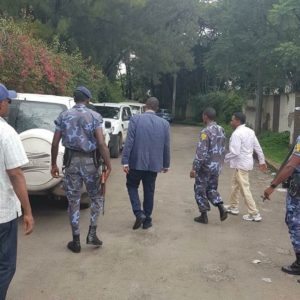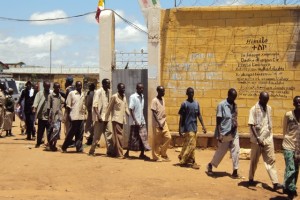By Mohamed Abdi
Ever since Somali region was annexed by Ethiopia, the region has neither known justice, nor collective fruitful struggle, and the crux of the problem lies in Ethiopia’s perception and attitude towards the region and its people; but the current wind of change ushered in by the Oromo people must alter the course of history and status quo of the Somali region, or else the whole country is at war with the distanced region and its Somali residents.
President Mustafe welcoming the flag

Ethiopia is entering a new phase of history and its people should keep abreast of the new change and development. The Somali region is the second largest and the third most populous state of Ethiopia’s nine ethnic federal states, yet the region is a very backwarded and marginalized one. And there are various reasons for the marginalization and backwardness.
On the one hand, Ethiopia’s attitude towards the region and its inhabitants is very complex. The country has always doubted the very patriotism possessed by the region’s people. Their Somali ethnicity has always caused them great upheavals, and prevented them from full participation in the country’s socioeconomic and political affairs. Consequently Somalis are not visible in the country’s institutions. Perhaps, Ethiopia belittles the Somalis’ weight and their contribution. If not so, they would be seen in the country’s many, varied institutions, including education, aviation, banking, foreign ministry, immigration, etc. The Somali people are cornered to their region and land inhabited by themselves.
It is their region. They own it. Nonetheless, the residents deserve to have a full access to the myriad opportunities of the country. They possess excellent education and stamina, so they must not be deprived of Ethiopia’s opportunities.
Because of its traditional, inherited suspicious attitude towards the Somali region, Ethiopia has been always indifferent to the people’s plight and protracted suffering of different sorts. Ostensibly, the country cares about the land, but not the people. Well, the land is theirs, and they will remain there so long the earth remains. Unfortunately, Ethiopia tightens its grip on the land, but fails to observe and respond to agonies experienced by the land’s residents. It is an ironic attitude which should not be accepted.

On the other hand, Somalis in the region do not entirely pull in the same direction. And their outlook regarding the region’s status has been seen through different lenses. Some say the region is under colonialism and it must be freed by force, others say we have to first unify our position and share things with Ethiopia. Both arguments are there. And based on these varied views, the collective identity of the region’s residents is sometimes blurred. What name does appeal to the collective identity and interest of the region’s people? The only name that can resonate with them and represent them collective is “Somalis”. So, let the people use this name, whether in peace or at war.
Ethiopia brutalized the Somali region by installing puppet leaders, thereby putting in place “A Puppet State”. Take the lately ousted president of the Somali region, for example. Ethiopia, then led by the former administration, inaugurated President Abdi Mohamud Omar (a.k.a Abdi Iley) for the region’s people. Equipped with no education and adequate administrative experience, he climbed the region’s top ladder and seized power. Soon after, he set up a puppet state, and he embarked on a path that led to destruction and dehumanization, and his masters applauded him for the destruction and degradation of the region.
He dismantled the region’s long held values and disjointed its people. He was a puppet leader leading a puppet state. He put the region’s power and resources in the hands of few individuals, who used them as they deemed necessary. They pocketed both revenues generated by the region and federal expenditure earmarked for developmental projects.
His regime implemented some ill-built projects, mainly schools, airports, and roads (The Federal Government built the longest, most durable road and he cannot take credit for this one.) Nevertheless, his mischievous actions far outweigh his achievements. President Abdi Iley and his aides detained traditional elders, distanced intellectuals and religious figures from the region’s affairs and politics, and dared to strip once guarded Somali women of their clothing. As all of these atrocities were befalling the Somali people, the puppet’s masters were watching from afar. There was not any where to turn to, or nobody to complain to. But the region’s residents held out hope and hurried to Allah to help them break free from Abdi Iley’s chains. Their supplication was granted.

Thousands of innocent citizens flocked to the region’s prisons for no apparent reasons. People were just caught, handcuffed, and put in solitary cells. It is a sickening situation. Hundreds of crimeless inmates contracted fatal diseases and died in their prison cells and had their bodies thrown in filthy places. Some lucky families (as they thought) were told to retrieve the bodies of their loved ones. Many chaste, prisoner women were raped and gave birth to illegitimate children in the prisons. The women were humiliated and robbed of their dignity and humanity. The vast majority of the prisoners languished in Jigjiga’s central prison, dubbed “Jail Ogaaden”. They screamed in this hellish prison in agony and tasted all kinds of brutality and humiliation. Sadly, there are many sinless people who are still screaming within its walls and asking for a rescuing hand. And crimes committed in this notorious prison reached a crescendo in the last few years of Abdi Iley’s time, calling for Human Rights agencies to investigate the matter. What they found was appalling: severely tortured people, raped women, orphaned children, and confiscated assets. Some gruesome abuses found by Human Rights Watch shook the tyrant regime to its core, forcing Abdi Iley to blame the region’s wretchedness on his masters. In his own words, he just executed orders given to him. What idiocy!
All along, the Ethiopian Federal Government was blind to the atrocities and despicable situations run by Abdi Iley’s system. Watching all these crimes, why did not the federal government intervene or care about the suffering of the innocent civilians? Who can provide any answers?
Those who ruled the country at the time did not listen to anyone except the perpetrator himself. When hundreds of Somali elders consisting of numerous Somali clans streamed to Addis-Ababa and complained about Abdi Iley and his brutal administration, they were neither listened to nor respected. Rather, the elders returned to their habitations empty handed. Many of them went back to Jigjiga, the region’s capital. Upon returning, Abdi Iley summoned them, gathered them together, and threateningly lectured to them. A little later he threw some of them in the prison. He enjoyed total impunity and nothing could bind him. In other words, he was accountable to no one.
Ethiopia’s history is gradually changing, and the current wind of change must bring about a new dawn for the Somali region. Prime Minster Abiy Ahmed of Ethiopia did a great favour for the Somali people by removing Abdi Iley. He was mammoth wrath unleashed on the Somali people to ruin and ravage them. And Dulmi Diid revolution (Somali people’s uprising) helped bring down the tyrant president. Comprising residents of the Somali region from all walks of life, the Dulmi Diid revolution buckled down, put their efforts together, and promised to unseat the oppressive regime. They succeeded, for they unseated the regime’s leader. When he finally left the region, tears dripped down the side of many people’s faces in relief. They were relieved of great agony.
Now Mustafa Omer (Cagjar) is holding the helm of the region. He is an educated man with positive attitude, but his clean personality can be easily corrupted if he does not take his very precautions. Like his predecessors, the current Ethiopian government has installed him; however, the Somali people in the region have high hopes in his leadership acumen and integrity. That said, he must be vigilant with deep vision and should stand up for his people and fight back, if necessary. Ethiopia must not impose orders on him, and he should not take orders from individuals living elsewhere in Ethiopia. Moreover, he has to dispense justice as he knows the bitterness of injustice. In fact, he and his family tasted gruesome atrocities.
The president needs to develop the region by designing impactful projects aimed at helping jobless people in the region, especially youth. The region’s annual budget is hefty and can achieve many things if utilized properly. For the region to develop, though, the president ought to keep an eye on corrupt individuals who steal and stash away funds meant for the general public. Anyone trying to prosper at the expense of the general public should be stopped.
President Mustafe has already promised to broaden Somali’s bond and build their collective interest. He is proud of Somalinimo and collective development. The instant he ascended the region’s leadership, he promised to reinstate the region’s flag trashed by his predecessors. The flag was restored on Sept 7, 2018 after the region’s parliament met for discussion. On this same day he tweeted: “We repeat: there is no contradiction between Somali nationality and Ethiopian citizenship. Proudly uphold symbols of Somalinimo without abnegating our national responsibility. We are Somali Regional State (SRS): no prefix, no suffix. The original flag returns.” The restoration of the region’s original flag is a big achievement, as it is a solid symbol for the Somali people in the region. And President Mustafe’s stance and statements are fairly bold. In an article I wrote in 2007, I lamented the removal of the Somali region’s flag. This is a flag cherished by the region’s residents. Let it return and fly high.
Somali region’s reinstated flag
Ethiopia is a country inhabited by many communities from different backgrounds and the Somali region’s people are one of these communities. Hence, the Somali people are entitled to everything that other Ethiopians are entitled to. But unless Ethiopia’s wrong attitudes aimed at the region’s residents change, they will never become equal citizens and will continue to suffer from all sorts of segregation. Therefore, the new Ethiopian leadership headed up by Prime Minster Abiy Ahmed must change the course of the country’s history and treat all citizens equally. This means Somalis have to be on the same footing. On the other hand, President Mustafe Omer of the Somali region ought to work hard and put the region’s interest first.
Mohamed Abdi
Email: [email protected]
—–
Mr. Abdi is a Somali-Canadian Writer
—————–
Related Articles:
–HASSAN JABHAD: AN INTERVIEW By WardheerNews
–Laughing Hyenas- Red flags the New Somali Regional President Should be Wary of By Liban Farah
–Jail Ogaden and the Flawed Judicial System of the Somali Region in Ethiopia By Karamarda Group
We welcome the submission of all articles for possible publication on WardheerNews.com. WardheerNews will only consider articles sent exclusively. Please email your article today . Opinions expressed in this article are those of the author and do not necessarily reflect the views of WardheerNews.
WardheerNew’s tolerance platform is engaging with diversity of opinion, political ideology and self-expression. Tolerance is a necessary ingredient for creativity and civility.Tolerance fuels tenacity and audacity.
WardheerNews waxay tixgelin gaara siinaysaa maqaaladaha sida gaarka ah loogu soo diro ee aan lagu daabicin goobo kale. Maqaalkani wuxuu ka turjumayaa aragtida Qoraaga loomana fasiran karo tan WardheerNews.
Copyright © 2024 WardheerNews, All rights reserved


